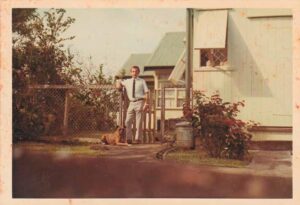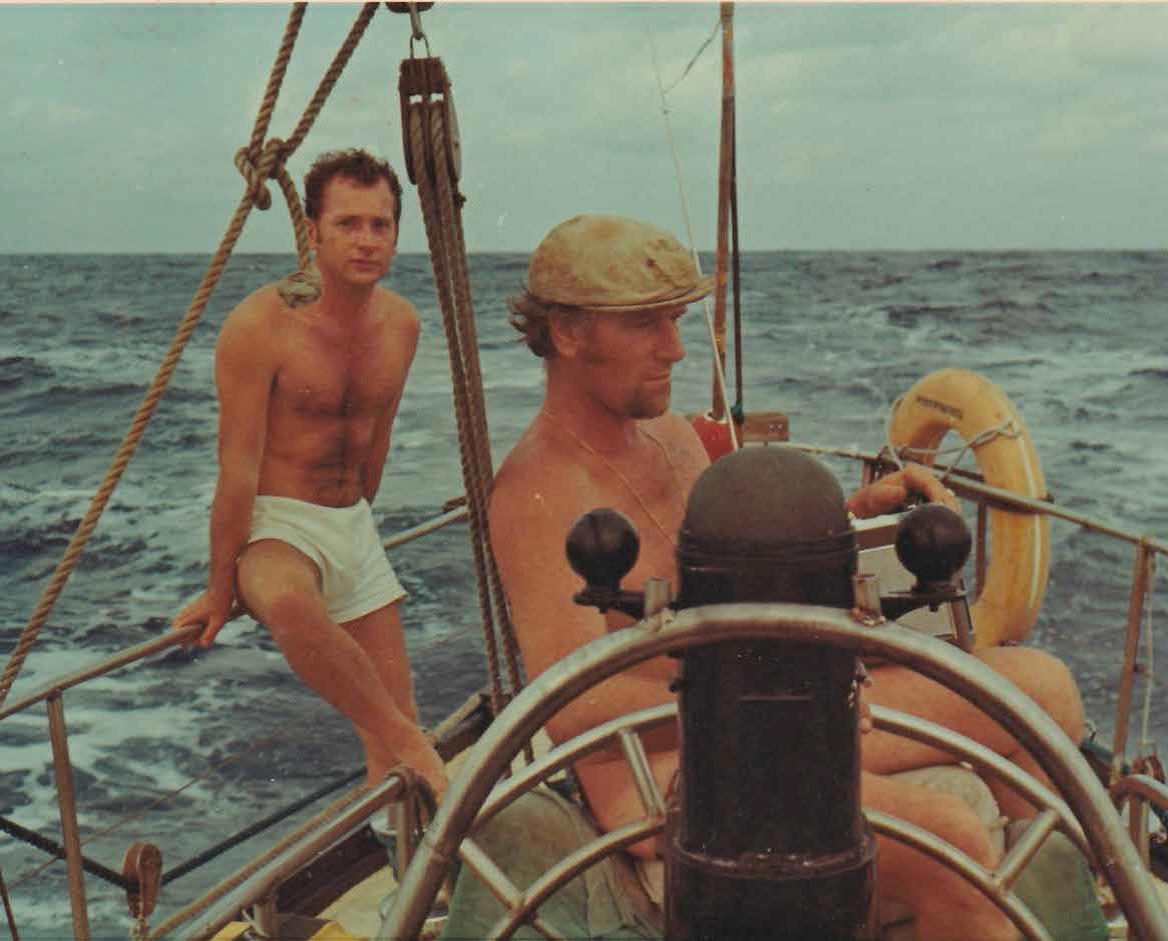Former Suva lawyer Robert Mitchell may not be in the bestsellers’ league but the books he’s written is enough to suggest he is, in his own right, a force to be reckoned with.
His latest novel, The stone dog, is an adventure thriller that moves between Australia and Fiji, a book Mitchell said he “enjoyed writing”.
His reason was it took him back to early 1970s Fiji when he was single, young and had much more energy than he has today.
The stone dog, revives the history of the German raider, Seeadler and stirs up an urban legend of “a sealed iron chest lowered into a bay in Fiji in 1917”.
In pursuit of the treasure, five adventurers decided to track it down, embarking on a “trail of peril, intrigue and bloodshed”.
The book offers glimpses of Mitchell’s unique experiences of living in Fiji and stories he heard about the famed island of Wakaya.
The stone dog
“Whenever Wakaya was mentioned in the company of any of the older identities in Suva, they would talk of treasure,” Mitchell shared with The Sunday Times.
“They would tell me about the sailing vessel See Adler, and they would tell me how the Count Felix von Luckner, the captain of the German raider, had hidden a treasure on Wakaya.”
According to popular tales that treasure consisted of all the loot he had taken from many British and Allied ships he had tricked and sunk during the First World War, a treasure which had never been found.
For many years the story darted in Mitchell’s head. He knew he had to tell it to the world.
“Then I remembered Bebe, the hurricane which hit Fiji in October 1972, her winds exceeding 200 kilometres per hour.
“And I recalled the fear she had brought with her. Von Luckner, Bebe, the Sea Devil’s treasure and Uncle Max. They were all I needed.”
Mitchell’s second novel, The crying stones, won second prize in the Courier-Mail Bicentennial Novel Competition, the official literary competition which celebrated Australia’s Bicentennial.
It is a novel about which Australian journalist, Sir Theodore Bray, said was “As good as the best of
Wilbur Smith”.
“It was one of my proudest moments,” recalled Mitchell.
The Melbourne-born and raised graduated from Melbourne University with degrees in Law and Arts.
He hoped to work as a solicitor for a couple of years before travelling around Europe for a while.
Unfortunately, the firm he started out with would not increase his salary from the then sum of fifteen pounds ($30) per week.
He bargained for twenty pounds ($40) but found one out in the country at forty pounds ($80) per week.
“I was with that firm for two years and married one of the local nurses, Marion,” Mitchell said.
Moving to Fiji
The couple decided to move back to Melbourne but found that neither the work nor the lifestyle suited them.
“Marion and I took our honeymoon on a cruise ship, the Himalaya. The ship had called in at Suva,” Mitchell said.
By “a string of coincidences”, he stumbled across an advertisement for a position in Suva and, “by further coincidences” he was interviewed the following day.
“It didn’t take either of us very long to decide on the move to Fiji and to the law firm – Cromptons,” he said.
“I was made a partner within six months and stayed with Cromptons for several years.”

In a tragic twist of events, Marion passed away because of pregnancy complications. It was only their second year in Fiji.
Like many would react when struck down with misfortune, Mitchell said Marion’s passing made him run “wild for a time”.
However, after finding his rhythm again, he “steadied and eventually married” his secretary, May, “more usually known as May Laan of Howell Rd”, he said.
Private practice
Mitchell wanted to be his own boss and run a law practice his own way. So he left Cromptons and set up his own firm, first in the dining room of his house up in Muaicolo Rd, Tamavua and then at Dominion House, in central Suva.
“I was able to do the kind of work which suited me, keeping away from criminal and matrimonial law, amongst a few other sectors,” he said.
Mitchell was a lawyer in Suva from 1969 until 1981. He had a two-year break in between when he joined two of his clients who ran a marine salvage business.
Reminiscing over his younger days as a Suva lawyer he said: “those early days in Fiji were great”.
He can vividly remember a few of his big cases.
One stands out.
“Perhaps my biggest case was when I acted for the Public Trustee in a matter known as the Bidesi case,” Mitchell said.
“It ran for twenty-six days in the Supreme Court and six or seven days in the Court of Appeal. We won in both courts. The other side appealed to the Privy Council in London, but were not successful.”
The colonial days
Mitchell agrees that the colonial era was an interesting time, with many politicians and civil servants having to “find their feet”.
“But it all went fairly smoothly.”
Mitchell also likes to believe Fiji was a better place back in the seventies, saying it was “quieter”.
“There weren’t as many cars. And there probably weren’t as many people either. I still get nostalgic for the old Fiji, still would love to go back, but it has passed us by.”
He said his two-year-stint as the owner of a one-third interest in a marine salvage company was both exciting and scary.
“In salvage, there can either be an avalanche of work or none. It can be dangerous. After my third close shave, I decided that salvage was not for me and I went back to the law.”
Moving back to Australia
By the time the 1980s rolled around, May and Mitchell had three children.
The couple knew the best education the kids could receive at the time would be overseas.
There was only one way so the family left Fiji.
This time he had dropped his Australian citizenship four years previously and had proudly taken out Fijian citizenship.
“I subsequently had to apply for permission to return to the country of my birth.”
“I kept my Fiji Citizenship well into the present century, refusing to apply for the return of my Australian passport. I liked being a Fijian.”
It was not until the Mitchells wanted to travel and stumbled over complicated procedures that he asked to have his Australian passport returned.
“I am still a Fiji citizen, but if I want my Fiji passport renewed I am told that I will first have to apply for Fiji citizenship.”
Writing career
Mitchell had always possessed a peculiar passion for other people’s flair for art.
He said he envied people like his brother-in-law, Chris Yee (of Leylands) who could draw, and others who could carve or paint – tangible things that can be “looked at, studied and appreciated.”
“A carpenter builds a house. A furniture-maker fashion a sideboard. But a lawyer produces a pile of papers. There is nothing to look at and smile about,” he said.
But as a lawyer, Mitchell had been a user of English words and language. And so he merely put this ability to good use and wrote his first book, Thursday’s Orchid.
He got the idea about the book long before he wrote it, however, he didn’t start writing it until several years after they had arrived back in Australia and were living in Gladstone, Central Queensland.
“The idea for Thursday’s Orchid came to me as I was down in the cargo hold of a 10,000-ton reefer ship sitting on a reef in the Louisiade Archipelago, in New Guinea during those earlier marine salvage years.”
A number of Mitchell’s books are treasure orientated – where the main characters are seeking something of value (The Stone Dog included).
But not all.
One book is a technoscience fiction.
Another is based on the stages a man progresses through as he passes from early adolescence to middle age.
In his second last book, a group of ex-Australian soldiers hijack a cruise ship while it is anchored in Champagne Beach, Espiritu Santo, Vanuatu.
Mitchell has a range of novels, as well as a small volume of short stories.
At the moment he has several ideas in the “incubator”, which he said needs “tossing around a bit more” before he starts developing them and putting them on paper.
Advice to Fiji writers
Mitchell has one important piece of advice for Fijians wanting to write – Never finish the day’s writing with your characters at the top of the mountain.
In other words, he said always “leave yourself somewhere to go when you start to work the following day”.
“If your heroes are climbing the mountain, don’t stop when they get to the top, because when you come back in the morning, you might have no idea as to where they are to go next.
“So, the previous day, or night, stop before they reach the crest, or take them over the crest and have them start to stumble down the other side, with rocks starting to slide, and then stop writing.”
Mitchell said one should not expect to make “The stone dog” adventure a fortune from writing.
“Write for yourself and those few friends who will read your work, and for a few others as well,” he said.



